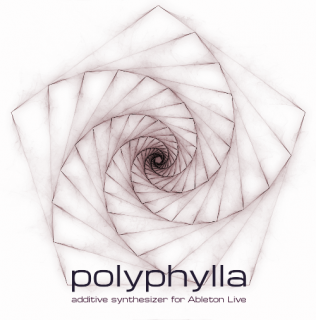
Developer Mei-Fang let us know about Polyphylla. a new Max for Live eight-voice additive synthesizer.
Polyphylla uses mathematical models, based on shapes and phenomena in nature, to create sounds that change organically over time.
At the heart of the synth is a flexible 120-partial additive oscillator coupled to an analogue-style noise generator, each with its own multimode filter. The oscillator offers three methods by which to generate and edit a base harmonic spectrum: simple analogue waveform emulation, knob-driven stochastic microtuning, and detailed graphical control of 32 partial groups. The noise generator, meanwhile, can be overdriven for extra grit.
Harmonic movement and dynamics are introduced to the signal using a powerful arsenal of fractal-inspired Motion processors. Level modulation of all partials together over time is drawn into the Motif Editor, while the Sweep, Attractor, Deform and Drift effects warp, bend and generally reshape them collectively and individually. Immediately informative real-time visual feedback on the partials and their playback is provided by the 2D Spectrum and 3D Motion Views.
Here’s the official video intro:
“The device is a result of my passion for sophisticated and unconventional sound,” notes Mei-Fang, “and the desire to design an interface for less tech savvy people to enjoy creating their own sounds.”
Polyphylla is available at the Ableton site for US $49. The manual is available at the Mellisonic site.

Sounds awesome! Remember the one about what do you feed a hungry parrot? http://tinyurl.com/polyfilla
Is this only for Ableton Live? Is there an AU version for those who use Logic, for example? Surely it’s not just limited to one platform, is it?
Sounds great – I’d buy it if it is available for Logic Pro X.
it is…
Yes, it’s only for Ableton Live. We don’t plan on making a VST plugin for other platforms yet, but if there are enough interests we’ll make that happen in the future. If you like, stay in touch here – https://www.facebook.com/mellisonic/
This looks like a powerhouse for pads, drones and atmospheres. But with the rhythmic elements some other especially cool things could happen too! I really think additive synths need to be designed more like this, to leverage the unique opportunities of the synthesis type, rather than as a way to generate static or “resynthesizes” standard wave forms..
what an awesome synth! would buy
@Dr Rock
It is a Max for Live device, so unfortunately only available for Live for the moment…